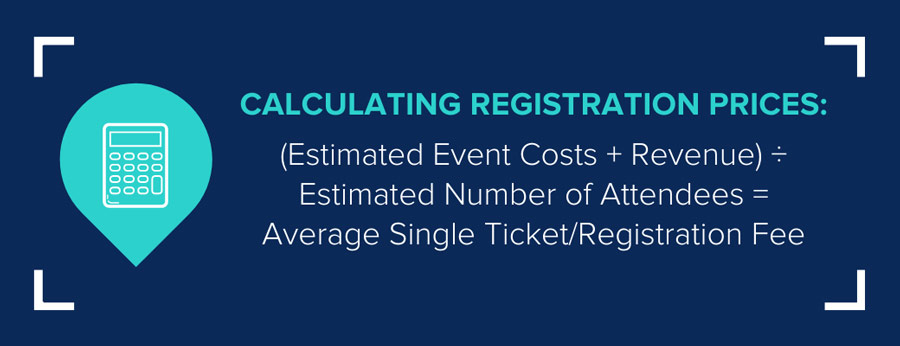Deciding on an event pricing model for your events can be a tricky task. How you price your events can play a crucial role in the relationship between your attendees and events, so it often comes down to balancing the business objectives for your event with the motivations of your prospective attendees. Easier said than done, but there are some simple considerations to help determine what makes the most sense for your event pricing strategy.
1. Know Your Objectives
Whether it’s driving revenue and pipeline or engaging your customers, the goals you’ve laid out for each individual event should drive the pricing model that you decide on. Prioritize the objectives that you’ve set out for your events and assess the metrics that you’ll use to measure your event success; these will be your northstar when determining which direction makes the most sense for your event.
If your aim is to drive revenue, start by having a clear understanding of how to calculate your average ticket or registration fee. The simplest formula to follow is to add your estimated event costs (any expenses budgeted for your event, including venue, catering, a/v, etc.) and event revenue (any revenue generated from ticket/registration fees), then divide that by the number of attendees you are planning on hosting. This should give you a baseline to work with in understanding your pricing guidelines.
2. Know Your Audience
Audiences will vary depending on your event type, and your pricing structure should reflect as much. An educational symposium will have a very different audience from a regional field event or user conference, so understanding your guests motivations for attending, as well as their financial situation (are they students, professionals sponsored by their company, etc.?), is a big piece of the pricing puzzle.
If possible, look back to past events to see how various audiences have responded to different pricing models, and keep an eye on how competitors are pricing similar types of events to the ones you’re evaluating. Keep in mind that if you’re being out-priced by competitors, there are other ways to win over audiences. If your event has a higher price point, a killer event program with unbeatable content and speakers will typically win out in the end, so make sure you have a clear understanding of who you are marketing your events to, and tailor your content accordingly.
3. Know Your Options
There are an overwhelming amount of event pricing options available to you depending on your goals, but not all will be applicable. Once you’ve evaluated the objectives and audience for your event, take the time to consider what pricing structure best aligns with those two key considerations.
Let’s take a look at some of the most effective strategies to help you determine your event pricing strategy, and ensure success for your event.
Early/Late Model
This includes the classic Early Bird, Regular, Late/Onsite pricing model and sets timeline perimeters around your registration prices.
Good for: Driving revenue, encouraging attendees to register and engage early.
Factors to consider: The higher the pricing, the further in advance people will register, so a longer lead time is key when marketing higher priced events.
Tiered Model
A tiered pricing model factors in different price ranges depending on the attendee type.
Good for: Educational conferences (e.g. Student, Faculty, Administrator pricing)
Factors to consider for a tiered model include whether or not to require proof of designated category (Student ID, faculty/company email address, etc.); limiting event access based on attendee type or price point.
Free Entry
This can be handled in in a number of ways – free to all who attend, free to those who pre-register (with a fee for onsite registrants), free entry with add-ons such as paid seating or workshops.
Good for: Events where revenue and capacity are not a concern; gaining new exposure, getting people in the door.
Factors to consider: The numbers can look scary from the start, but be patient — attendees are 60% more likely to register on the day of a free event than for paid events.
Pricing add-ons & modifications:
- Group Bookings – Do you anticipate attendees from the same organization coming to your event (employees, students, teammates, etc.)?
- Discount Codes – Offer discounted rates for partners, sponsors, etc.
- Member Pricing – Members or affiliates receive a lower price registration than non-members
- VIP Pricing – Special pricing for designated VIP guests
- Flash Sales – Offer a brief discounted rate for a select time period (good for boosting last-minute sales)
(For a more extensive list of pricing models, check out Event Manager Blog’s pricing strategy guide.)
4. Use the Data that You Already Have
It goes without saying that before you settle on an event pricing plan, you should always be sure to take a look back at past events. To help get ahead of your next events season, use the data collected by your event management software to help you analyze your past event pricing strategies to see what worked and what didn’t.
Use polling and surveys to ask your audience what they think of how your event was priced, and use those learnings to help inform similar event types that you have planned for the year ahead.
You have a wealth of information at your finger tips on what motivates your potential attendees, how events have delivered for your business in the past, and what it is that you can offer your attendees in the way of a truly memorable experience that keeps them coming back for more. Use this to your advantage as you evaluate the best way forward.
Need help evaluating your event pricing strategy? Contact us today to discuss how Certain’s team of event industry experts can help you determine the best options for your business objectives.

